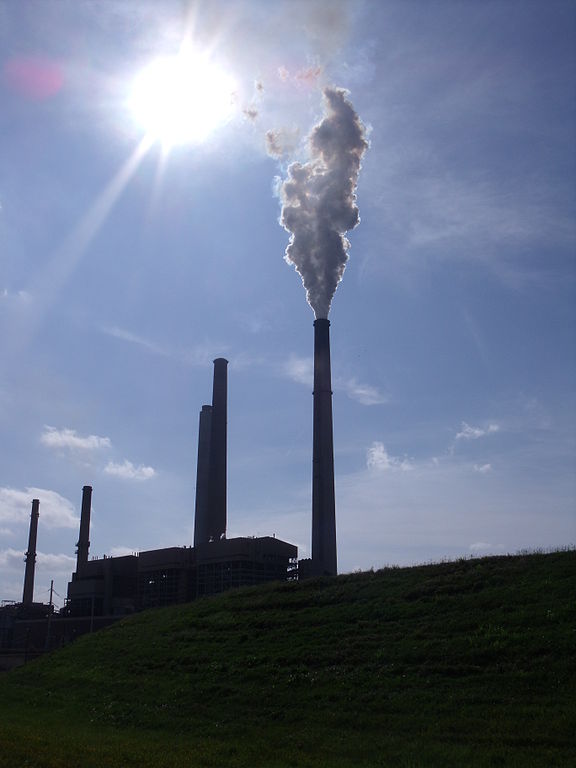Fossil Fuel Disinformation Campaign Driven by Profit Motives, Not Concern for Minority Communities
By Joel A. Francis
Last week, the Natural Resources Defense Council (NRDC) released an important new report, Bridging the Clean Energy Divide, that refutes highly misleading fossil fuel claims about clean energy policies and communities of color.
The report also calls attention to the large potential benefits of clean energy to fixed- and low-income individuals, including:
- well-paying jobs in the clean energy industry;
- lower energy costs through energy efficiency;
- better health and lower health care costs due to reduced fossil fuel pollution; and
- greater reliability in terms of power prices.

Renewables create jobs; Department of Energy Engineer at Work.
There are a myriad of negative health impacts dirty energy imposes on low-income communities and communities of color. As the report, Coal Blooded: Putting Profits Before People, by the NAACP, Indigenous Environmental Network and Little Village Environmental Justice Organization, also shows, “overall, a small number of coal power plants have a disproportionately large and destructive effect on the public’s health, especially on the health of low-income people and people of color.” That’s partly due to the fact that “coal power plants tend to be disproportionately located in low-income communities and communities of color.”
It’s also because the combustion of coal emits many toxic pollutants – sulfur dioxide, nitrogen oxides, fine particulates, mercury, arsenic, lead and uranium to name just a few.
According to the NAACP, “African Americans are hospitalized for asthma at three times the rate of whites, and the death rate from asthma is 172 percent higher for African-Americans than for whites.” That is due largely to coal-fired power plant pollution. Fine particulates are especially harmful, as they “can cause premature death in people with heart or lung disease, as well as cause chronic bronchitis, irregular heart conditions, and aggravated asthma.”

Coal Power Plants Negatively Impact the areas in which they are placed.
In stark contrast, clean energy emits no pollutants at all, and thus has no adverse health impacts, saving both lives and high medical costs for the people who can least afford them. Even better, as NRDC notes, energy efficiency improvements “allow low-income households to lower their energy costs without sacrificing service…reducing bills for all.”
How much money?
Research cited in the report shows multi-family housing owners and residents could save “up to $3.4 billion every year.” Given that more than half of “very low-income renters” live in multifamily housing, energy efficiency would provide a major gain for low-income families and communities of color.
As for the claim that renewable energy is only affordable by higher-income people, the research counters that narrative. In fact, with smart policies, such as net metering, which study after study shows has more benefits than costs, all families can reap the rewards.
For instance, NRDC cites community solar power, “which pools the resources of multiple community members and allows people to purchase as little or as much renewable energy as they wish.” Another benefit of community solar is that it can be placed in inhabitable places, such as “repurposed toxic, abandoned, or unsightly spaces or on large, well-situated rooftops, which may aid the rehabilitation of existing buildings” – perfect for poor, possibly blighted, areas.
Finally, NRDC notes the positive economic impact of clean energy, with an analysis finding that policies similar to the Environmental Protection Agency’s Clean Power Plan could create more than 274,000 jobs around the country. Even better, these are good jobs, “accessible to those without advanced degrees,” and with a “typical wage for someone employed in a clean energy industry—about $44,000…13 percent higher than the national typical wage.”
The bottom line is that clean energy means a healthier environment, greater savings, increased consumer choice and the creation of good jobs. Can the fossil fuel industry say the same?
To be blunt, if the fossil fuel lobby really cared about low-income individuals and communities of color, they’d locate their toxic plants elsewhere, hire from these communities at greater rates and stop their attempts to undermine clean energy, including disinformation campaigns aimed at “disconnect[ing] communities of color from solar.” The fact that they aren’t doing any of those things is extremely revealing as to what’s motivating them.
Joel A. Francis is a senior fellow at the Checks and Balances Project, a national watchdog that seeks to hold government officials, lobbyists, and corporate management accountable to the public.






Recent Comments